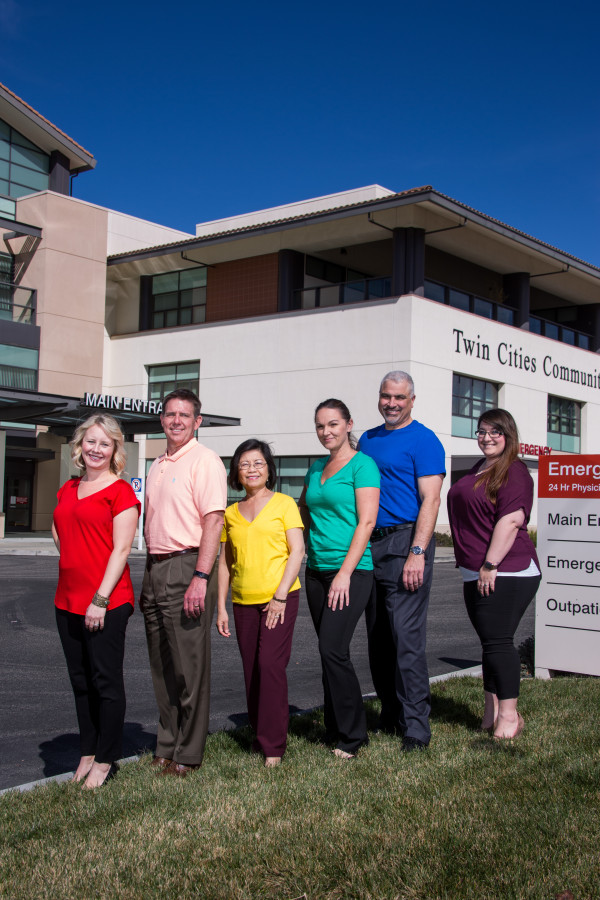Twin Cities earns ‘LGBTQ Healthcare Equality Leader’ designation

Left to right: Shannon Downing, Marketing Manager Jim Lipcamon, Director of Radiology Agnes Stitch, Patient Navigator Jackie Howey, Director of Patient Access Mark Lisa, Chief Executive Officer Sara White, Patient Access Supervisor
The march toward full equality is not slowing
—Twin Cities Community Hospital has earned its “LGBTQ Healthcare Equality Leader” designation from the Human Rights Campaign Foundation (HRC), becoming the first and only hospital in San Luis Obispo and Santa Barbara counties to do so. The designation was awarded in the 11th edition of the Healthcare Equality Index (HEI), released today. A record 626 healthcare facilities actively participated in the HEI 2018 survey, with HRC Foundation proactively researching key policies at more than 900 additional non-participating hospitals. Of those included in the HEI, 418 earned a “LGBTQ Healthcare Equality Leader” designation.
“At Twin Cities, we are focused on providing a safe and welcoming environment to everyone we serve and to delivering high-quality care to all our patients,” said Mark Lisa, CEO of Twin Cities Community Hospital. “As such, we must provide care that is culturally competent and patient-centered to all people, regardless of race, ethnicity, religion, gender, sexual orientation, gender identity or expression, national origin, age, disability or veteran status.”
Twin Cities Community Hospital first started working toward this designation in 2016 with the establishment of its LGBTQ Healthcare Advisory Council. The council is made up of hospital employees and community members whose mission is to create a respectful and dignified care environment for all patients. In addition to patient advocacy, the council also strives to engage and support the LGBTQ community with educational workshops, community forums and local LGBTQ events.
“With some of our biggest battles still ahead of us, it is crucial that institutions continue to demonstrate that the march toward full equality is not slowing down,” said Chad Griffin, HRC President. “The 626 participants in this year’s HEI continue this march in partnership with the LGBTQ community and we commend them for their leadership. For over a decade, the HEI has been the roadmap to closing the gap in ensuring equal care to LGBTQ patients and their families, and we urge every healthcare facility to join us in this continuing effort to provide inclusive care to all.”
The 11th edition of the HEI marks the second year that participants are given a numerical score based on their LGBTQ-inclusive policies and practices. HEI participants are given scores in four criteria: foundational elements of LGBTQ patient-centered care, LGBTQ Patient Services and Support, Employee Benefits and Policies and LGBTQ Patient and Community Engagement. Twin Cities uses this criteria to ensure it is a welcoming and inclusive hospital for all patients, employees and visitors. The goal is to ensure that everyone at the facility continues to feel safe, secure and protected from discrimination. Participants that receive the maximum score in each section earn the coveted status of “2018 LGBTQ Healthcare Equality Leader.”
In the 2018 report, an impressive 418 facilities, including Twin Cities Community Hospital, earned HRC’s “LGBTQ Healthcare Equality Leader” designation with a score of 100. Another 95 facilities earned the “Top Performer” designation for scoring from 80 to 95 points. With 82 percent of participating facilities scoring 80 points or more, healthcare facilities are going beyond the basics when it comes to adopting policies and practices in LGBTQ care.
Of the hospitals who did not participate in the HEI but were scored based on research, only 63 percent have patient non-discrimination policies that include both “sexual orientation” and “gender identity,” and only 53 percent were found to have an LGBTQ-inclusive employment non-discrimination policy. The equal visitation policy, at 93 percent, is the only one that comes close to matching the rate of the participating facilities.
The Human Rights Campaign Foundation is education arm of America’s largest civil rights organization working to achieve equality for lesbian, gay, bisexual, transgender and queer people. HRC envisions a world where LGBTQ people are embraced as full members of society at home, at work and in every community.









